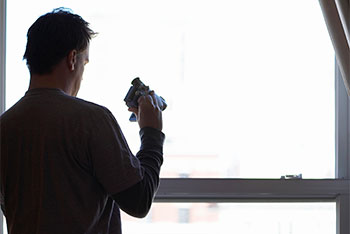 Sept. 24, 2015 – A state appeals court has ruled that a law barring sex offenders from photographing minors in public without consent from parents is unconstitutionally overbroad, reversing convictions against a registered sex offender.
Sept. 24, 2015 – A state appeals court has ruled that a law barring sex offenders from photographing minors in public without consent from parents is unconstitutionally overbroad, reversing convictions against a registered sex offender.
A criminal complaint alleged that Chris Oatman photographed and video recorded multiple kids who were playing outside his home. The images, the basis for 16 counts, focused on the buttocks and crotch areas, but were not obscene or pornographic.
Ultimately, Oatman pleaded guilty to eight counts under Wis. Stat. section 948.14, which says “a sex offender may not intentionally capture a representation of any minor without the written consent of the minor's parent, legal custodian, or guardian.”
The circuit court in Brown County imposed a 12-year prison sentence, followed by 16 years of extended supervision. However, Oatman preserved his right to challenge statute’s constitutionality on appeal. Recently, he won his appeal on this issue.
In State v. Oatman, 2014AP2084-CR (Sept. 22, 2015), a three-judge panel for the District III Court of Appeals ruled that section 948.14 is unconstitutionally overbroad.
The panel noted that a statute is overbroad “when its language, given its normal meaning, is so sweeping that its sanctions may be applied to constitutionally protected conduct [that] the state is not permitted to regulate,” citing prior case law.
 Joe Forward, Saint Louis Univ. School of Law 2010, is a legal writer for the State Bar of Wisconsin, Madison. He can be reached by email or by phone at (608) 250-6161.
Joe Forward, Saint Louis Univ. School of Law 2010, is a legal writer for the State Bar of Wisconsin, Madison. He can be reached by email or by phone at (608) 250-6161.
Oatman argued that the First Amendment to the U.S. Constitution protects the right to take photographs of children in public places, so long as the photos are not obscene or pornographic. The State said photos taken for personal use are not protected.
“Rather, the State argues photographs are only constitutionally protected if they are created with an expressive or communicative intent, i.e., an intent to share the photographs with others,” wrote Reserve Judge Thomas Cane.
“Because we conclude that statute is overly broad on its face, we need not address whether it is also unconstitutional as applied to Oatman,” Judge Cane noted.
The panel noted that section 948.14 is not “content-neutral” because it only regulates images of children and not images of all people.
To pass constitutional muster, the panel noted, the “content-based” statute must withstand strict scrutiny, which requires the state to show a compelling governmental interest that cannot not be achieved by less restrictive means.
“The State undeniably has a compelling interest in protecting children. However, Wis. Stat. § 948.14 does little, if anything, to further that interest,” Judge Cane wrote. “Indeed, it appears to carry the potential of more harm than good.”
The panel noted that the law requires registered sex offenders to obtain permission from the parents or guardians of minor children before taking their photos.
“But how does one subject to the statute know the identity of a child’s parents or whether those parents are available to give consent?” Cane wrote.
“The sex offender’s only option to obtain consent from an apparently unsupervised child is to approach the child and then inquire, ‘Are your parents nearby?’”
The statute, the panel noted, may encourage predators to make close contact with children and explain that they were attempting to follow the law if questioned.
The panel also explained that children are not harmed as subjects of nonobscene, nonpornographic photos taken in public places. It noted that the U.S. Supreme Court, in 2002, struck down as unconstitutionally overbroad a federal law that prohibited distribution of child images that were not pornographic or obscene, including virtual or simulated images of children who were not actually real people.
“Accordingly, while we may dislike the fact that someone might have objectionable thoughts when viewing ordinary images of children, the State is constitutionally prohibited from precluding citizens from creating such images,” Judge Cane wrote.
The panel invalidated section 948.14 in its entirety.
